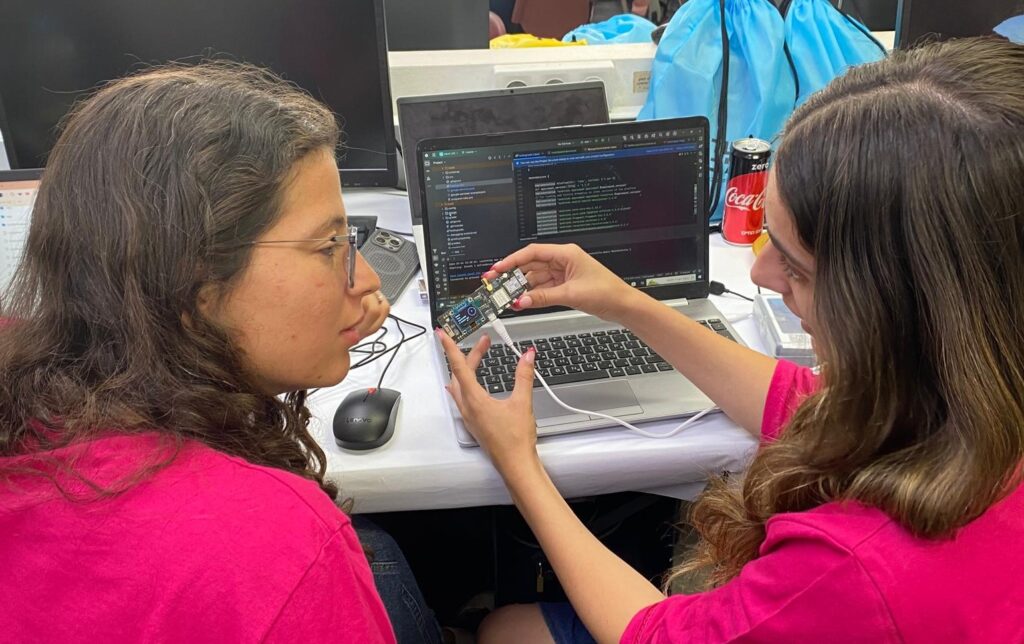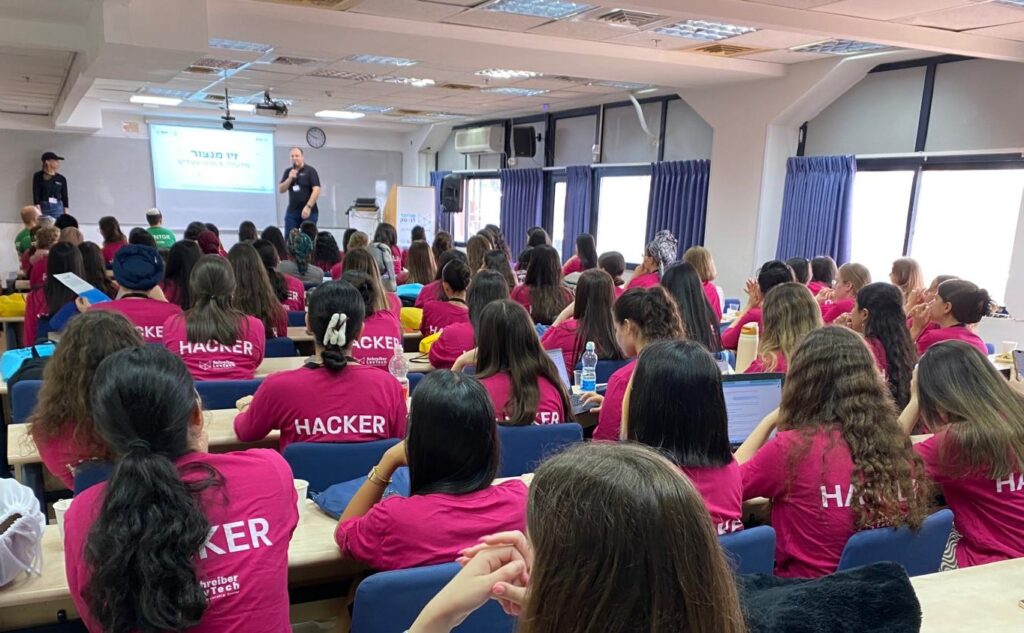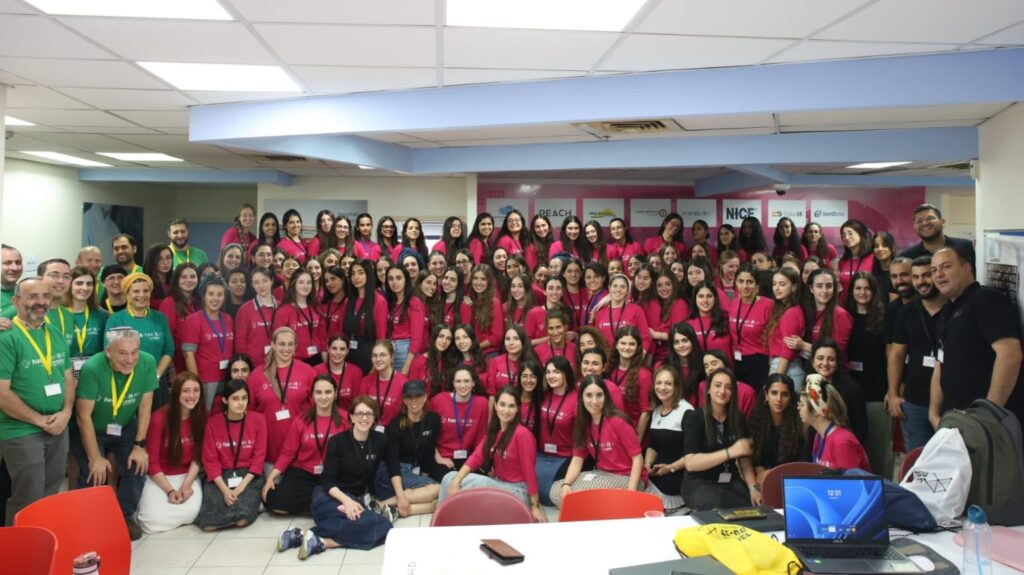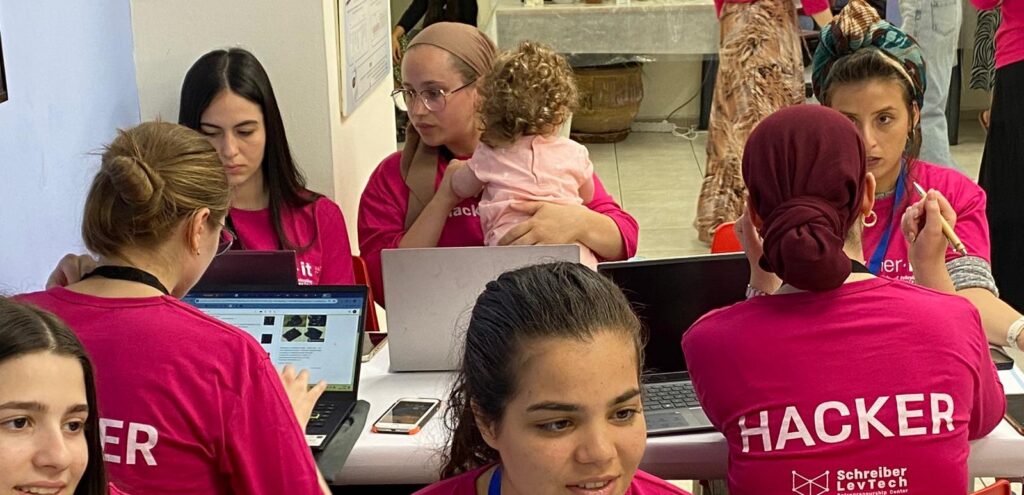A device to help find lost travelers without cellular service, a secure communications network for local civil defense groups, a platform to detect falls in the elderly, and a shower designed specifically for people who have lost one or more limbs.
All four sound like developments from companies in Israel’s vaunted high-tech sector, but are actually among the innovations devised by groups of religious Jewish women during a 26-hour hackathon recently held in Jerusalem.
Sporting vibrant pink shirts, the 120 participants in the 7th annual “Hack.Her.It” competition organized by Jerusalem College of Technology’s Schreiber LevTech Entrepreneurship Center were all students at one of the three JCT campuses – Tal, Tvuna and Lustig. Hack.Her.It is a play on the Hebrew slang word hackerit – a female hacker.
The annual event showcases the importance of empowering religious women to become innovators in the workforce.
“It’s been so inspiring to witness these young women, some of them literally juggling young babies in their hands, come up with cutting-edge solutions to very real problems,” said Orlee Guttman, co-founder of the Schreiber Levtech Entrepreneurship Center.
“We’re proud of the accomplishments of everyone who participated in this event.”
A similar hackathon for religious men was held soon after the women’s event, with the same goal of imbuing its participants with a personal understanding of what they can achieve.

“To create systemic change in the Orthodox and ultra-Orthodox (Haredi) communities, we need to create a cadre of men and women who are innovative leaders,” Guttman tells NoCamels.
“They need to be innovative at their workplaces and succeed at senior positions within companies and organizations (intrapreneurship) and/or with their own startups (entrepreneurship).”
But, Guttman explains, many members of these communities are starting at a disadvantage compared to secular Israelis: Despite being talented and intelligent, they have no prior exposure to the high-tech industry and no experience in product creation.
And it is these skills, she says, that are crucial to advancement in the workplace.
JCT offers the students a chance to develop those skills, and indeed among the hackathon participants were women studying for degrees in software engineering, computer science, business administration, and industrial engineering and management.
Sharing a similar philosophy are some of the leading companies both in Israel and the whole world, evidenced by their various expressions of support for the hackathon.
Taking an active role in the event were Rafael Advanced Defense Systems and Elbit Systems, two of Israel’s major defense technology companies, who set tasks for the competition. And the winning innovation – the wearable device for lost travelers – was a challenge set by Elbit, who also provided mentorship for the women.
“We had the honor to personally accompany [the winners] and be impressed by their skills and abilities,” Elbit said at the close of the event. “We are happy and proud to take part in a project that promotes the future tech generation in Israel.”
The Schreiber LevTech Entrepreneurship Center, Guttman tells NoCamels, is determined to tap into the ingenuity of members of the Orthodox and Ultra-Orthodox community, which it sees as an underappreciated resource in the Startup Nation.
“We need men and women who understand how to look at a problem, understand the implications and think creatively about how to develop a solution, very often involving technology,” she says.
“These can include issues in the healthcare sector, education, homeland security and more. They need to have the self-confidence and skills that come from having been trained to understand and design solutions.”
Sign up for our free weekly newsletter
SubscribeAnd that, she adds, is what the Schreiber LevTech Entrepreneurship Center does.

Guttman says that the college recognized that the students like to work on projects that help the larger community and the country as a whole.
As such, the hackathon partnered with companies and organizations that could provide challenges along those lines, such as technology solutions for emergency response teams, those with physical challenges and social service organizations.
Other sponsors of the event came from Israel and abroad, including the disabled veterans’ organization Beit Halochem (warriors’ house), the Women’s Amutot Initiative of Miami, the Jewish Women’s Fund of Atlanta and US financial services organization Cross River.
The judges panel also had an impressive roster of participants, among them Pnina Ben Ami, VP Marketing at Jerusalem Venture Partners, and Talia Berkowitz, Director of R&D production programs at Mobileye.
One of the most important aspects of the hackathon, according to Guttman, is showing the participants that they are able to meet the demands of the high-tech sector, and are equipped with the skills that are needed to succeed in this workplace.
“Many of them were not aware before that they have the ability to create a product, they have the ability to learn new technology overnight and create a working prototype by the next day,” she says.
“It opens their minds to things that they never knew they could accomplish.”
The participants themselves are in agreement, inspired by their surroundings and by their own ability to meet the challenges presented to them.
“It’s been amazing trying to come up with innovative solutions to a real-life problem in just a few days,” said participant Shifra Wexler. “It’s great to be a part of such a robust learning environment.”
Wexler was part of a team that worked on camera software that could immediately contact the authorities if it detected that a violent event had occurred.
The team was inspired by the mass terror attack carried out by Hamas on October 7, which triggered the ongoing war in Gaza, as surveillance cameras had managed to record many of the atrocities but did not have the ability to alert the authorities.

And the open door to the sector presented by the hackathon did not close once the competition was over.
Schreiber LevTech continues to work with the women who participated in the competition, offering them the options of working further on their products from the hackathon via the college’s pre-accelerator program or meeting with the companies that presented the challenges in order to discuss a joint project.
“Even students who do not continue on with these particular projects, but rather work in other companies after graduation, have [acquired] a skill set that is very valuable,” says Guttman.
“They can think out of the box and they’re not afraid to try new things and to lead. And they learn how to figure things out on their own, which is amazing.”
Related posts

Rehabilitation Nation: Israeli Innovation On Road To Healing

Harnessing Our Own Bodies For Side Effect-Free Weight Loss





Facebook comments